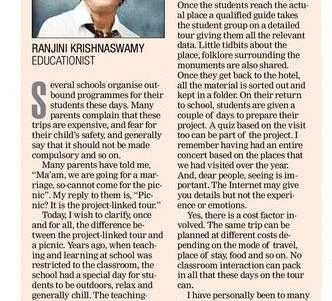Many parents complain that these trips are expensive, and fear for their child’s safety, and generally say that it should not be made compulsory and so on.
Several schools organise outbound programmes for their students these days. Many parents complain that these trips are expensive, and fear for their child’s safety, and generally say that it should not be made compulsory and so on.
Many parents have told me, “Ma’am, we are going for a marriage, so-cannot come for the picnic”. My reply to them is, “Picnic? It is the project-linked tour.”
Today, I wish to clarify, once and for all, the difference between the project-linked tour and a picnic. Years ago, when teaching and learning at school was restricted to the classroom, the school had a special day for students to be outdoors, relax and generally chill. The teaching-learning program has undergone a sea change (at least in most schools), and day trips and visits to museums, parks, libraries etc are part of the school program. In my last two articles I spoke of projects, assignments and internal assessments; the school trip is an extension of that.
These tours are organised during the school term on working days and are intricately woven within the curriculum. The school usually does a recce of the places involved to check their relevance and importance to the scheme of studies. The teacher has a clear cut agenda — maximising the 4-5 days to ensure optimum learning with the least stress. A worksheet is prepared and given to the child. This will be attached to the places to be visited and also have broad details about the place. The child will know what to look out for and what material to gather. Once the students reach the actual place a qualified guide takes the student group on a detailed tour giving them all the relevant data. Little tidbits about the place, folklore surrounding the monuments are also shared. Once they get back to the hotel, all the material is sorted out and kept in a folder. On their return to school, students are given a couple of days to prepare their project. A quiz based on the visit too can be part of the project. I remember having had an entire concert based on the places that we had visited over the year. And, dear people, seeing is important. The Internet may give you details but not the experience or emotions.
Yes, there is a cost factor involved. The same trip can be planned at different costs depending on the mode of travel, place of stay, food and so on. No classroom interaction can pack in all that these days on the tour can.
I have personally been to many of these trips to be convinced of their place in the educational program. I have travelled with children, stayed in the same hotel and eaten the same food. Not expected any preferential treatment because of my being a school head and I know that these trips help in the overall learning experience. The teachers invariably do not sleep while on these trips. If these trips are so stressful for the teachers why do they go on them then? Because teachers are a breed that work to building the future other people’s children and the trip is definitely no picnic for them.
Author: Dr. Ranjini Krishnaswamy
Email: jinikay@gmail.com
This Article was published in the DNA Newspaper (Mumbai Edition) on 11th April 2017. You can read it here.





